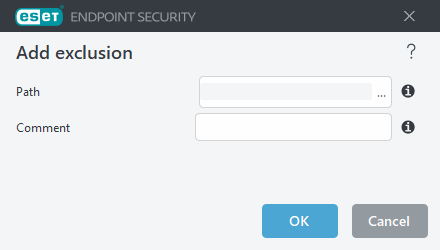This dialog window excludes a specific path (file or directory) for this computer.
|

|
To choose an appropriate path, click ... in the Path field.
When entering manually, see more exclusion format examples below.
|

You can use wildcards to exclude a group of files. A question mark (?) represents a single character, whereas an asterisk (*) represents a string of zero or more characters.
|

|
- If you want to exclude all files and subfolders in a folder, type the path to the folder and use the mask *
- If you want to exclude doc files only, use the mask *.doc
- If the name of an executable file has a certain number of characters (with varying characters) and you only know the first one (for example, "D”), use the following format:
D????.exe (question marks replace the missing/unknown characters)
Examples:
- C:\Tools\*—The path must end with the backslash (\) and asterisk (*) to indicate that it is a folder and all folder content (files and subfolders) will be excluded.
- C:\Tools\*.*—Same behavior as C:\Tools\*
- C:\Tools—Tools folder will not be excluded. From the scanner perspective, Tools can also be a file name.
- C:\Tools\*.dat—This will exclude .dat files in the Tools folder.
- C:\Tools\sg.dat—This will exclude this specific file located in the exact path.
|
|

|
You can use system variables like %PROGRAMFILES% to define scan exclusions.
- To exclude the Program Files folder using this system variable, use the path %PROGRAMFILES%\* (remember to add backslash and asterisk at the end of path) when adding to exclusions.
- To exclude all files and folders in a %PROGRAMFILES% subdirectory, use the path %PROGRAMFILES%\Excluded_Directory\*
 Expand list of supported system variables Expand list of supported system variables
The following variables can be used in the path exclusion format:
- %ALLUSERSPROFILE%
- %COMMONPROGRAMFILES%
- %COMMONPROGRAMFILES(X86)%
- %COMSPEC%
- %PROGRAMFILES%
- %PROGRAMFILES(X86)%
- %SystemDrive%
- %SystemRoot%
- %WINDIR%
- %PUBLIC%
User-specific system variables (like %TEMP% or %USERPROFILE%) or environment variables (like %PATH%) are not supported.
|
|
|

|
Using wildcards in the middle of a path (for example C:\Tools\*\Data\file.dat) may work but is not officially supported for the performance exclusions. See the following Knowledgebase article for more information.
There are no restrictions to using wildcards in the middle of a path when using detection exclusions.
|
|

|
Order of exclusions:
- There are no options to adjust the priority level of exclusions using the top/bottom buttons (as for Firewall rules where rules are executed from top to bottom).
- When the first applicable rule is matched by the scanner, the second applicable rule will not be evaluated.
- The fewer the rules, the better the scanning performance.
- Avoid creating concurrent rules.
|

